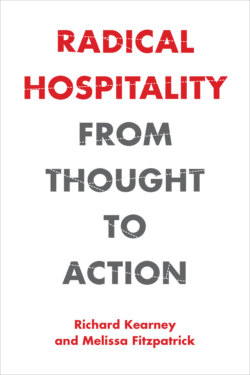Читать книгу Radical Hospitality - Richard Kearney - Страница 9
На сайте Литреса книга снята с продажи.
Introduction
ОглавлениеWhy Hospitality Now?
This volume addresses a timely challenge for contemporary philosophy: the ethical responsibility of opening borders, psychic and physical, to the stranger. Drawing on key critical debates on the question of hospitality ranging from phenomenology, hermeneutics, and deconstruction to neo-Kantian moral critique and Anglo-American virtue ethics, the book engages with urgent moral conversations regarding the role of identity, nationality, immigration, commemoration, and justice. It also explores novel options for the application of an ethics of hospitality to our current world of border anxiety, boundary disputes, refugee crisis, and, perhaps most pressingly—in light of the 2019 United Nations Intergovernmental Panel on Climate Change report—the looming ecological challenge. We discuss such critical applications in terms not only of our social and political worlds of practice but also within the crucially formative life of the classroom. The move we propose from text to action is ultimately one of pedagogy and praxis.
The climate emergency has turned the relationship between host and stranger into a crisis we confront daily: not only the fundamental task of hosting the environmental stranger—where nature demands to be our guest—but also our response to strangers at our borders. Just think of the border disputes we read about in the daily news: Syria and Turkey, the United States and Mexico, Russia and the Ukraine, Israel and Palestine, North Korea and South Korea, or Northern Ireland and the Republic of Ireland (a perennial dispute made topical again with the Brexit crisis facing Europe as we write). A key controversy in every major election campaign of our time—in the United States, United Kingdom, continental Europe, Asia, and Africa—is that of strangers at the frontier, whether they go by the name of migrant, immigrant, refugee, alien, or invader. Who is in and who is out? Who belongs to the nation and who does not? Who deserves shelter and who does not? Who should stay and who should go? Back to where they came from—if there is anything left for them? Who decides the answer to these questions? And according to what criteria, interests, and intentions?
Thomas Meaney’s controversial essay, “Who’s Your Dance Partner?” (2019), highlights this question in relation to current EU debates on immigration.1 Meaney argues that while European politicians try to parse the difference between asylum worthies, economic migrants, and climate refugees and all the while collaborate with the authoritarian regimes that produce them, a wiser approach might be to embrace a different paradox: namely, to heed Kant’s cosmopolitan claim that the earth belongs to everyone, and at the same time lessen the dire need for Africans and Asians to come to Europe while insuring that their journey is safer and easier. But rather than think creatively about such possibilities of mutual collaboration, Europe and the UK seem to have settled on “a narrow strip of ground.” One proposed name for the next top official of UK Migration is “President for Protecting Our Way of Life,” and the EU commissioner speaks of the need for a “Europe That Defends and Protects”—referring, of course, to the protection of existing members of the European Community, not to migrants who seek refuge there. UK Prime Minister Boris Johnson was even less equivocal about immigrants in his defense of a little England for Little Englanders. And the America that Trump wished to make “great again” was one that excluded what he called Mexican “rapists and murders” and Africans from “shithole countries.” The crisis is acute, and it is set to worsen exponentially as the climate situation grows more alarming and despotic leaders on every continent increasingly endanger their own peoples. Never has the stranger been more in need of hosts to provide shelter, sustenance, and dignity. And never have the doors of welcome seemed more shut.
Hospitality is a notion as old as human culture. It has been claimed that “civilization begins with the handshake.”2 One needs but a cursory glance at the foundational texts of great mythologies and wisdom traditions to be reminded of this. To mention some classic examples from Western culture: think of the biblical stories of Abraham and Sarah hosting the strangers under the Mamre Tree,3 of Jesus hosting the strangers on the road to Emmaus (the ministry of Christ began with a marriage feast at Cana and ended with a last supper in Jerusalem).4 Or think of the ancient Greek epics of Homer (Simone Weil notes this formative ethics of hospitality in her brilliant commentary on the Iliad), or the hosting of Hermes and Zeus by Baucis and Philemon in Ovid. The subsequent course of Western literature is full of scenes of hospitality from the feasts of Chaucer and Rabelais to the sharing of food in the classic scenes of Monseigneur Muriel with Jean Valjean in Les misérables and the miraculous banquet of Babette’s Feast. But while our religions, myths and literatures are replete with narratives of hosting and guesting, our history of Western thought has been strangely mute on the topic, at least until recently. If it is true, as Paul Ricoeur says, that “the symbol gives rise to thought,” it is high time that “thought” stepped up to the plate. A new hermeneutics of hospitality is needed in our age of mounting hostility. And the need is both epistemological (what can we know?) and ethical (what can we do?).
